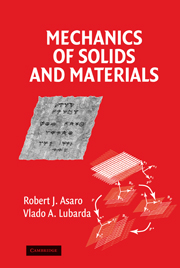Book contents
- Frontmatter
- Contents
- Preface
- PART 1 MATHEMATICAL PRELIMINARIES
- PART 2 CONTINUUM MECHANICS
- PART 3 LINEAR ELASTICITY
- PART 4 MICROMECHANICS
- PART 5 THIN FILMS AND INTERFACES
- PART 6 PLASTICITY AND VISCOPLASTICITY
- 26 Phenomenological Plasticity
- 27 Micromechanics of Crystallographic Slip
- 28 Crystal Plasticity
- 29 The Nature of Crystalline Deformation: Localized Plastic Deformation
- 30 Polycrystal Plasticity
- 31 Laminate Plasticity
- PART 7 BIOMECHANICS
- PART 8 SOLVED PROBLEMS
- Bibliography
- Index
26 - Phenomenological Plasticity
Published online by Cambridge University Press: 06 July 2010
- Frontmatter
- Contents
- Preface
- PART 1 MATHEMATICAL PRELIMINARIES
- PART 2 CONTINUUM MECHANICS
- PART 3 LINEAR ELASTICITY
- PART 4 MICROMECHANICS
- PART 5 THIN FILMS AND INTERFACES
- PART 6 PLASTICITY AND VISCOPLASTICITY
- 26 Phenomenological Plasticity
- 27 Micromechanics of Crystallographic Slip
- 28 Crystal Plasticity
- 29 The Nature of Crystalline Deformation: Localized Plastic Deformation
- 30 Polycrystal Plasticity
- 31 Laminate Plasticity
- PART 7 BIOMECHANICS
- PART 8 SOLVED PROBLEMS
- Bibliography
- Index
Summary
When stressed beyond a critical stress, ductile materials such as metals and alloys display a nonlinear plastic response. This is sketched in Fig. 26.1 for a uniaxial tensile test of a smooth specimen, where some relevant terms are defined. In general, plastic yielding is gradual when resolved at typical strain levels (e.g., ∼ 10−4). A critical stress, called the yield stress, is defined, which is the stress in uniaxial tension, or compression, required to cause a small, yet finite, permanent strain that is not recovered after unloading. It is common to take this onset yield strain as ey = 0.002 = 0.2%. Some common general features of plastic flow, with reference to stress vs. strain curves, are:
The σ vs. e response is nonlinear and characterized by a decreasing intensity of strain hardening, measured by the slope dσ/de, as the strain increases. Generally, dσ/de ≥ 0.
Unloading is nearly elastic.
Plastic deformation of nonporous metals is essentially incompressible, i.e., volume preserving. A discussion of the physical basis for plastic deformation in subsequent chapters will explain why this is so.
As noted, a schematic stress-strain curve during uniaxial loading and unloading of an elastoplastic material is shown in Fig. 26.1. The initial yield stress is Y (later terms such as σy will be used to denote yield stress). Note that the yield stress is now ideally represented as a stress level at which an abrupt transition from linear, purely elastic, to nonlinear, elastic-plastic deformation occurs.
- Type
- Chapter
- Information
- Mechanics of Solids and Materials , pp. 461 - 501Publisher: Cambridge University PressPrint publication year: 2006



